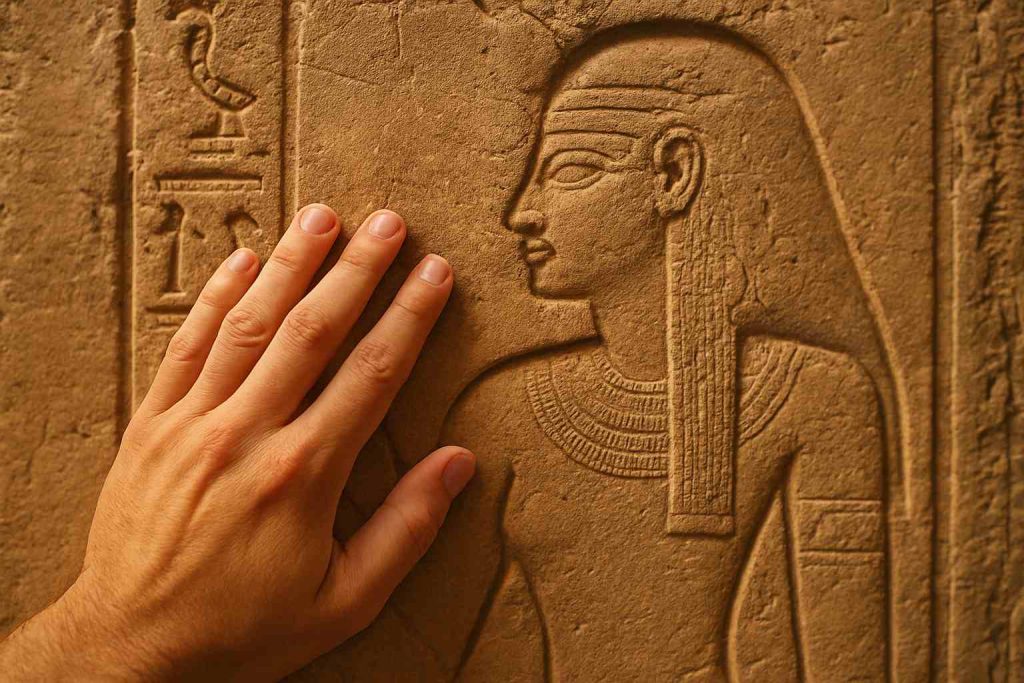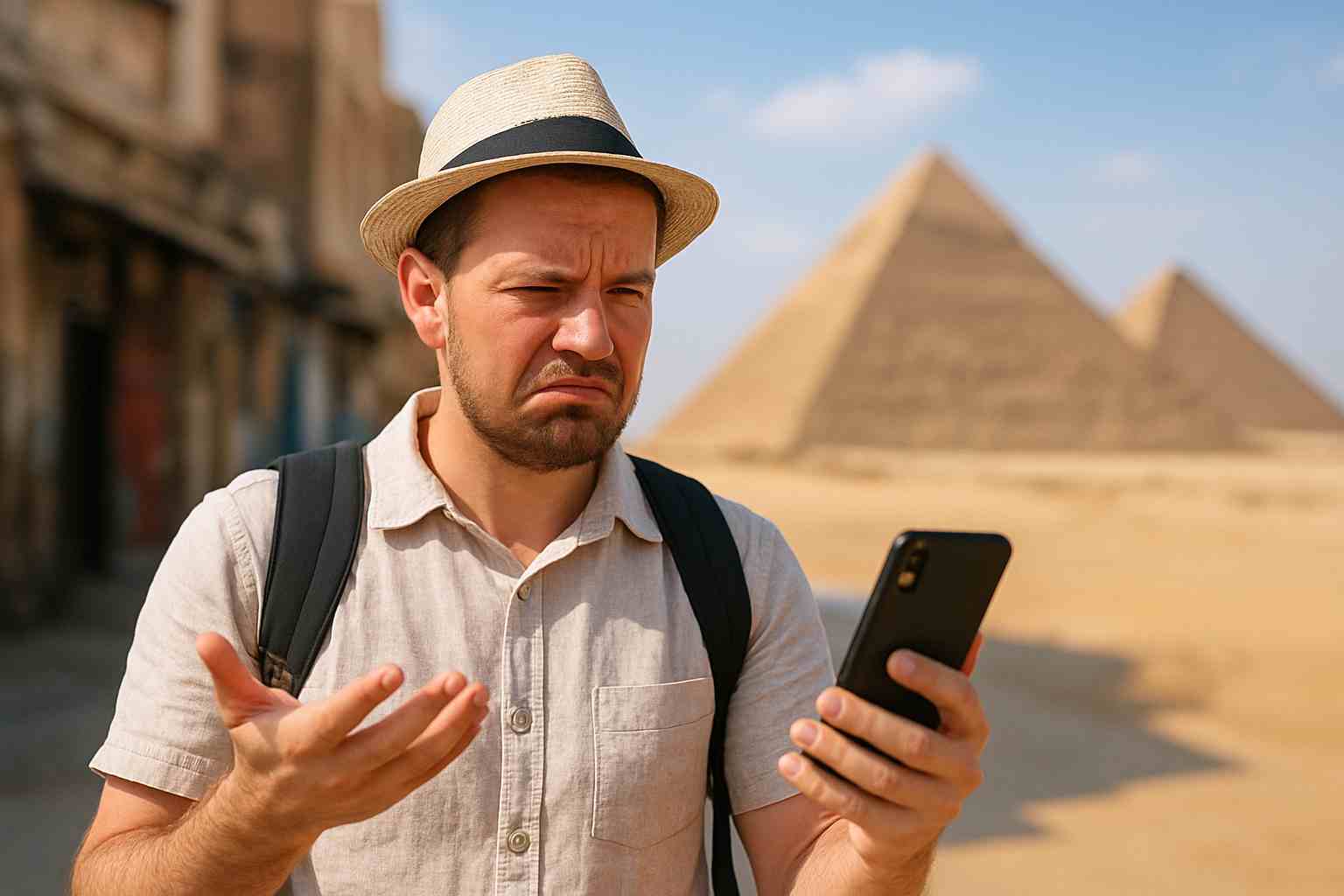Featured image: A “budget” guide or app deal can leave you stranded — and frustrated — even in front of the Pyramids
I would much rather sit down and write a story of a pharaoh or a temple priestess right now, but I am feeling compelled to write this instead. You would not believe the number of emails I have gotten over the last three months. Dozens of them. All asking for advice on itinerary planning, for detailed tour pricing, for “just a quick question.”
And at this stage, I’ve developed an almost psychic ability to read between the lines after a couple. I can tell the genuine inquirer from the one who is just… shopping.
Some people have no compunction about wasting my time, exchanging 15, 20, even 30 emails, question after question. Both of us know they are simply pricing the market for comparisons, draining my time and energy without any intention of booking. I bear them no ill will—everyone has their journey, and that path reaps its own rewards.
But the sheer volume of these requests has finally pushed me to write this post. Not for myself, not to scold, but to speak directly to you, the traveller. I need to tell you, plainly and clearly, what awaits these “budget” plans you’re so carefully researching.
Because when you chase the lowest price in Egypt, you aren’t just getting a cheaper version of the same experience. You are buying a completely different—and often damaging—trip. What you call “saving money,” the budget tourism circuit here calls a “target.”
The True Cost of a ‘Budget’ in Egypt
-
You’re Risking Your Health: “Budget” often means cutting corners on your accommodation hygiene and food quality. I’m talking about hotels that don’t have pest control standards. Bed bugs, rats, cockroaches, ants and parasites are not a myth; they are a reality in establishments that prioritize cheap turnover over guest well-being. The cost of a doctor and the misery of being sick on vacation will wipe out any “savings” instantly.
-
You’re Risking Your Safety (and Sanity): A “guide” who offers a cut-rate price is not a guide. He is a hustler with a script. He has no formal training, no deep knowledge, and his entire goal is to extract more money from you through commissions at papyrus “museums” and perfume “factories.” You will not see Egypt’s heart; you will see the inside of his cousin’s shops.
-
You’re Gambling with Your Logistics and personal safety: I see some praising Uber. Let’s get real. Uber in Egypt is not the Western Uber. The cars can be less reliable, and drivers often cancel if the route isn’t profitable for them. Imagine the panic of a ride to the airport that simply doesn’t show up. And hailing a regular taxi? Here, a driver will lean out the window, ask where you’re going, and if it’s stuck in traffic or too far, he’ll just drive off. He’d rather make five short, lucrative trips than one long, gridlocked one. Your time and plans mean nothing to his bottom line.
-
You’re Risking Your Peace of Mind: That “friendly local” who says he can get you a better deal is the gateway to a labyrinth of gullibility. You will be passed from one “trusted friend” to another, each taking a small piece of your budget and a large piece of your patience. And a word of advice: never try the “I don’t have money” line. An Egyptian man will simply laugh. In his mind, you caught a flight across the world to get here. You have money. That little lie just marks you as both naive and dishonest, and he will see it as a challenge.
The “Digital” Trap: The Illusion of the Booking App
And now let’s talk about the modern pitfall: the online guide-booking service or app. You contact me, you contact a traditional travel agent, and then you compare us to a price you see on a website or an app. “This guide is cheaper here!” you think.
For heaven’s sake, wake up!
Let’s follow the money for a second. How much commission do you think that app is taking from the guide? 20%? 30%? Sometimes more. So if you see a “bargain” price, what does that mean for the guide’s actual take-home pay?
It means it’s not enough. It means that guide, from the moment you meet, is already operating at a loss on the base price and must make that money back from you, and then some.
He is not a bad person for this; he is playing the game the system has set up. But you are the one who will ultimately pay for it. That “cheaper” guide now has a powerful incentive to:
-
Shorten your tour to fit in another paying client.
-
Lead you, “as a friend,” to the commission-based shops where your wallet is the target.
-
Invent “special, off-the-books” add-on experiences that come with a hefty, cash-only price tag.
And let’s talk about credentials. When you book through a reputable operator, your guide’s qualifications are clear and verifiable. With a guide from an app, what assurance do you really have? And if things go wrong—who do you turn to? I’ve seen it – guests who paid a deposit online for a guide wait patiently at my door for them – and nobody turns up. Sure, maybe they can spend time fighting for their money back – but what they can’t ever get back is the missed tour because when they are gone home, well, their window of opportunity to visit the temple or site is gone too.
On an app? What are you checking? A five-star review?
Think back to our first conversation. The most potent scam is the one that makes you feel like a friend. Those glowing reviews are often from people who were successfully manipulated into believing they had a “special” connection. They were love-bombed with false familiarity and don’t even realize they were led by the nose through a series of shops and sob stories. They’re praising the very illusion that cost them a genuine experience.
You are not hiring a friend. You are hiring a qualified professional. The platform that facilitates a true professional relationship is built on transparency and verified credentials, not on a reviews section filled with the testimonials of the blissfully duped.
Don’t outsource your once-in-a-lifetime trip to an algorithm designed for gig workers. The cost is hidden, but you will pay it in full.
The Philosophy: Egypt is Not a Place to “Wing It”
Egypt is a demanding, intense, and utterly magnificent country. It overloads the senses in the best way possible. To process it, to truly absorb its magic, you need a foundation of security and comfort.
A horrible experience in Egypt is worse than a horrible experience anywhere else because of the sheer weight of its history and your own expectations. To come all this way and be left with memories of sickness, scams, and stress is a tragedy.
My Plea to You:
Wait. Save for another six months. Another year. Whatever it takes. My own first trip to Egypt was on a budget and though it was through an Irish travel agent, it had hidden costs I was not equipped to pay. Fortunately for me, I knew I was coming back and I have spent the last 25 years doing my best – from writing my travel advice posts to organising tours to providing accommodation, to ensure everyone coming to me for their “once in a lifetime” Egyptian experience gets just that, and 99% of the time I succeed.

Your dream trip to see the Pyramids, to sail the Nile, to stand in the Valley of the Kings… that dream deserves a framework that protects it. It deserves a clean, safe bed to return to. It deserves a real guide who unlocks the stories, not a hustler who locks you into a scam.
Don’t let a price tag on a website trick you into buying a nightmare. The cost of a bad trip is always higher than the price of a good one.
I believe in a different kind of travel. If you’re ready to invest in your experience, not just pay for a price tag, my team and I are here when you are.

